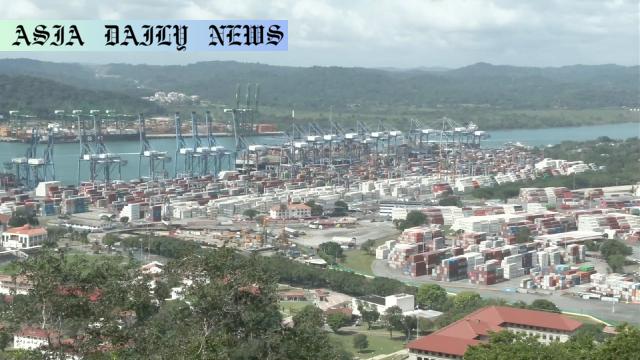Panama Canal Deal: Hong Kong conglomerate halts signing of port sale involving BlackRock amid speculation.

Background: The Panama Canal Deal in Focus
The recent announcement regarding the delay of a major port sale near the Panama Canal has generated headlines across global financial and political circles. At the center of this delay is CK Hutchison, a prominent Hong Kong-based conglomerate, which previously revealed plans to sell 90% of its stake in operations managing two key Panamanian ports. This sale was set to benefit a consortium composed of major players, including the US investment giant BlackRock. Initially, the signing of the deal was scheduled for no later than April 2, marking significant interest in securing control of assets located near the critical Panama Canal trade hub.
However, in a surprising turn of events, CK Hutchison has reportedly postponed the signing, as confirmed by media outlets in Hong Kong. Although the conglomerate has not offered an official statement clarifying the rationale behind the delay, multiple speculations are swirling. While there has been no indication the deal is entirely off the table, political factors, as well as concerns over national strategic interests, have cast a shadow over the proceedings. The Hong Kong and Macao Affairs Office of China’s State Council has further intensified attention on the matter by republishing related articles, indicating heightened scrutiny from Beijing.
The Role of Stakeholders and the Impact of Media Speculation
CK Hutchison’s choice to delay the signing comes amid complex discussions involving multiple stakeholders. The consortium purchasing the Panama-based ports includes BlackRock, a powerhouse in global asset management. The move to sell major infrastructure assets linked to the globally significant Panama Canal underscores strategic considerations for multiple nations, not just the parties involved in negotiations. Yet, Hong Kong’s local media has begun voicing skepticism over the deal, with strongly pro-Beijing publications questioning whether the conglomerate sufficiently weighed China’s national interests.
Such questions are not without merit. The importance of the Panama Canal as a transportation artery cannot be overstated. Control of infrastructure surrounding such a valuable international shipping route could have implications extending from trade to geopolitical maneuvering. By postponing the signing, CK Hutchison may be navigating the delicate balance between fulfilling private business objectives and adhering to national or political expectations. Amid this backdrop, the influence of media coverage—both within Hong Kong and globally—adds another layer of complexity to the unfolding story.
Broader Implications: Trade, Politics, and Investment
The postponed Panama Canal deal reflects an increasing intersection between private enterprise and geopolitics. As the global economy becomes more interconnected, the scrutiny surrounding decisions to sell or buy such strategic assets also grows. For investment entities like BlackRock, their participation signals confidence both in the value of ports near the Panama Canal and in the potential economic growth derived from controlling such infrastructure. However, the involvement of an American-owned entity can also spur political comparison, particularly when stakeholders hail from territories influenced by China and the United States, two economic superpowers often seen at odds in international affairs.
In this case, the delay could lead to broader reverberations for cross-border investments in regions tied to the Belt and Road Initiative (BRI), China’s expansive infrastructure program. Whether CK Hutchison eventually proceeds with the sale may depend on decisions made by influential backers or regulators assessing its compliance with national and international priorities. The deal’s outcome may also shape future collaboration between Hong Kong firms and Western-led investment groups, signaling either growing alignment or emerging reluctance to cooperate amid shifting geopolitical alliances.
Outlook: What Lies Ahead for the Panama Canal Deal?
Ultimately, the delay in signing the Panama Canal deal underscores the complex interplay of commerce, sovereignty, and diplomacy. Should CK Hutchison proceed with concluding this transaction at a later date, it will likely face continued scrutiny from Hong Kong-based critics concerned about long-term strategic interests. If the deal falters or collapses, it risks sending further ripples through the realms of global trade investment and political negotiation. For now, this development serves as a case study in the challenges involved when business negotiations carry implications beyond balance sheets, directly touching upon national interests and international relations.
Commentary
The Complexity of Private-Public Balance
The delayed signing of CK Hutchison’s port sale near the Panama Canal is more than just a pause in a business transaction—it’s a testament to the intricate balance between private business interests and public-national imperatives. It is not uncommon for major infrastructure projects or asset transfers to face elevated scrutiny, particularly when they touch on sensitive locations such as the Panama Canal. What seems like a straightforward international business agreement is revealed to be affected by a wide array of concerns, including political sensibilities and strategic considerations.
Geopolitical Undercurrents at Play
One of the more fascinating aspects of this case is the geopolitical context in which it is unfolding. For investors and enterprises operating in today’s global stage, making decisions that intersect with regions like South America, key trade zones, or near China’s sphere of economic influence means embracing a multilayered process of negotiation. The involvement of U.S.-influenced players like BlackRock juxtaposed with CK Hutchison’s Hong Kong base places the deal at an evident crossroads between different power blocs.
Looking Beyond the Immediate Delay
What happens next will undoubtedly set an important precedent for transactions of this scale and nature. Whether CK Hutchison moves forward with its plans to sell this strategic stake, the decision will resonate well beyond the region or sector. The business world will likely take cues from this development, adapting their approaches in ways that strike a more careful balance between profit-driven aims and geopolitical sensitivities. Meanwhile, the media’s role in amplifying critical voices further emphasizes how public perception can shape the trajectory of otherwise private agreements.


